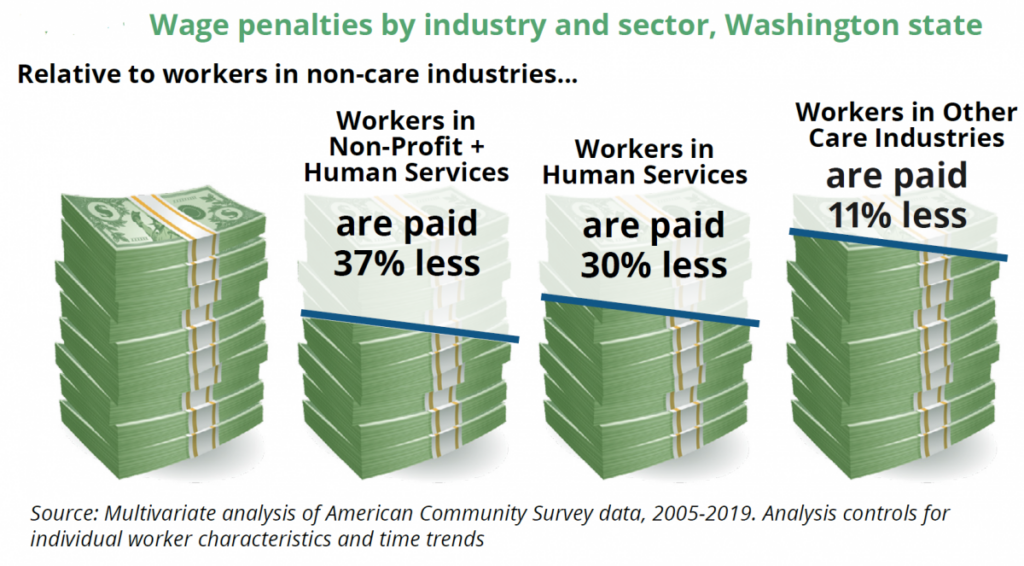Note: This article is an adaption of a Seattle City Council Central Staff Memo. The full memo is available on Legistar.
The Seattle City Council, responding to an ongoing staffing crisis, passed a resolution today expressing the Council’s commitment to wage equity for nonprofit human services worker.
The resolution was sponsored by Councilmember Lisa Herbold. It passed 8-1 with Councilmember Sara Nelson voting no.
It follows the February 2023 publication of the University of Washington’s (UW) Wage Equity Study for Human Services Workers. That study found a 37 percent wage gap between nonprofit human services workers and workers in other industries, despite evidence that human services work is not easier, less skilled, or less demanding than other jobs.
The impact of low wages on human services providers
Multiple public and private entities report that low wages in the non-profit human services sector create negative impacts for staff recruitment and retention, impeding the City of Seattle’s ability to effectively provide human services for the City’s most vulnerable communities and address critical issues, such as reducing homelessness. Examples include:
- According to the King County Regional Housing Authority, service providers report that staffing vacancies impact their ability to provide services, including their ability to successfully utilize all contracted funds. Low wages, paired with secondary trauma, contribute to staff burnout and turnover. Based on an informal April 2022 Authority survey of service providers, the five largest homelessness service providers in King County had more than 300 vacant positions.
- The Office of Housing reports that wages for many staff in Permanent Supportive Housing (PSH) buildings are well below median income and that PSH providers are seeing much higher rates of unfilled staff positions compared to national and state averages. Staffing shortages at non-profit organizations have been severe enough to restrict the City’s capacity to open new housing units, including those serving people exiting homelessness.
- The 2021 King County Nonprofit Wage & Benefits Survey Report found that wages for nonprofit employees providing services such as shelter provision and violence prevention are at levels that make it difficult to sustain a career.
What the UW Wage Equity Study found
In the 2022 budget, Council added $600,000 to the Human Services Department (HSD) for a study analyzing the comparable worth of human services jobs as compared to jobs in different fields that require similar skills, education, and difficulty. At the conclusion of a competitive RFP process, HSD contracted with the University of Washington (UW) School of Social Work to conduct this study. In February 2023, UW published a Wage Equity Study comprised of a market analysis and job evaluation.

The market analysis found a 37 percent wage gap between non-profit human service workers and workers in non-care industries, which would take a 59 percent wage increase to close. It also found that workers who leave the human services industry for jobs in other industries see a net pay increase of seven percent a year later. The job evaluation found that the gaps revealed in the market analysis between human services workers and workers in other industries do not reflect lower pay because human services work is easier, less skilled, or less demanding than other jobs.
The Wage Equity Study included short and long-term recommendations for closing the wage gap for human services workers. By 2025, the study recommended that non-profit human services organizations, with the support of their funders, should increase human services workers’ wages by at least seven percent, as a starting point to immediately reduce the number of workers leaving human services posts for higher-paying jobs in other industries. The study also recommended that any wage equity increases should be separate from inflationary increases. By 2030, the study recommended substantial wage increases for non-profit human services workers to align with those of workers doing comparable work in other sectors and industries.
What the resolution would do
The resolution would state the Council’s acknowledgement of its responsibility to make a meaningful contribution toward achieving wage equity for non-profit human services workers by:
- Recognizing the short-term and long-term recommendations in the UW Wage Equity Study without committing to all of them;
- Collaborating with private and public funders to make joint progress on wage equity;
- Intending to consider recommendations to increase the total amount of HSD-administered contracts by seven percent by 2025 for purposes of wage equity and possibly consider additional increases in 2026 and beyond;
- Making wage equity adjustments separate and in addition to inflationary adjustments currently required by City law under SMC 3.20.060;
- Considering additional actions upon reviewing HSD’s response to Statement of Legislative Intent (SLI) HSD-300-A-002-2023, which is due on June 20, 2023;
- Requesting a plan from HSD on how the department would incorporate wage equity into their review of Request for Proposal responses and their contracting process, to help ensure that increases in contracts for purposes of wage equity is used to increase worker wages; and
- Requesting that the Executive consider wage equity increases for human services contracts administered by departments outside of HSD and provide a report with information on those contracts, using SMC 3.20.050 as a starting place for developing criteria for what constitutes a human services contract.

